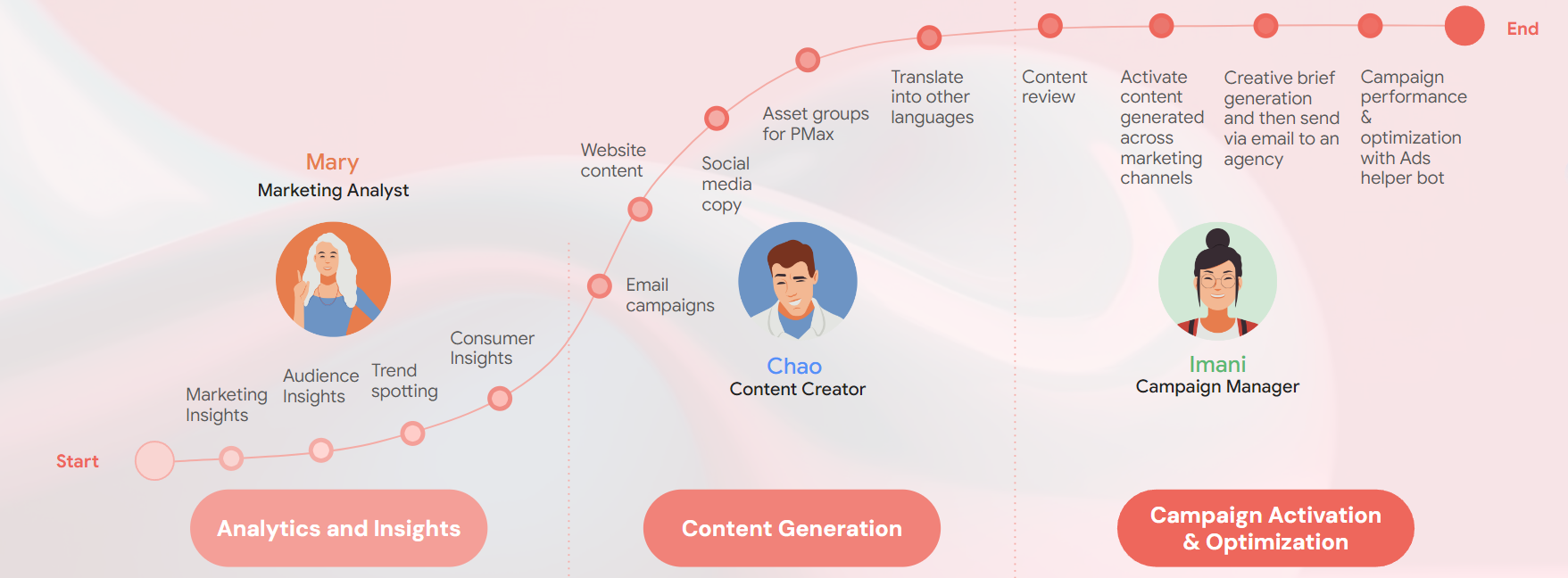highIn today’s dynamic marketing landscape, the integration of artificial intelligence (AI) is not just a trend but a necessity for staying competitive.
As reflected in the graphic below, AI can be applied across the entire marketing campaign lifecycle, enhancing the speed and quality of marketing insights, optimising content and personalisation of experiences, and improving the all-round intelligence of digital strategies.
However, to harness the full potential of AI in your marketing endeavours, establishing a robust data foundation is key and should be seen as the #1 AI marketing essential.

Image Source: Google Cloud – AI for Marketing
What makes a data foundation suitable and ready for AI?
1. Data Quality: The Backbone
To achieve optimal results, AI algorithms rely heavily on accurate and high-quality data.
Just as a recipe’s outcome suffers from inaccurate measurements and subpar ingredients, AI marketing efforts falter without accurate and current data.
It’s critical therefore to prioritise data quality through meticulous cleansing procedures, active governance practices, and a steadfast commitment to accuracy.
Without clean data, such as accurate product descriptions and customer purchase history, the AI algorithm may suggest irrelevant products, leading to decreased customer satisfaction and lower conversion rates.
Continuing the analogy, maintaining data quality is akin to keeping your kitchen well-stocked and organised. Here’s where customer data centralisation tools such as Wondaris come in as your digital pantry manager. XPON customers use wondaris to consolidate customer data from various sources (website forms, email marketing platforms, social media interactions) into a unified profile. This data integration eliminates data silos, reduces redundancies, and ensures consistency – all crucial aspects of data integrity.
For example, let’s consider an e-commerce business aiming to utilise AI for product recommendations (e.g. via Google Cloud’s Recommendations AI). With a tool like Wondaris taking care of data hygiene, the e-commerce business can free up its human capital to focus on strategic marketing initiatives and analyzing the AI’s recommendations for further optimization.
2. Data Integration: Breaking Down Silos for Comprehensive Insights
Marketing initiatives span multiple channels and platforms, generating a wealth of data that often remains siloed.
You can maximise the full potential of AI in your marketing by integrating disparate data sources, allowing for a holistic understanding of the customer journey.
This unified approach enables AI algorithms to uncover invaluable insights and patterns across various touchpoints or customer data sources.
Example: A multinational retail chain collects data from its online store, mobile app, social media platforms, and in-store transactions.
By integrating this high-integrity data, you can gain a comprehensive view of customer behaviour, enabling AI-powered algorithms to continuously improve customer insights and tailor marketing campaigns based on individual preferences and interactions across all channels.
3. Data Relevance: Streamlining Insights for Effective Marketing
Not all data is created equal. Focus on collecting and analysing relevant data points that directly contribute to your marketing objectives.
By prioritising pertinent information such as customer demographics and engagement metrics, AI algorithms can generate more accurate predictions and deliver personalised experiences.
A software-as-a-service (SaaS) company for example tracks user interactions with its platform, including feature usage, subscription plans, and support inquiries.
By analysing this relevant data, the company can identify patterns indicating user preferences, pain points, and potential upsell opportunities, allowing AI algorithms to customise outreach efforts and improve customer retention.
4. Data Privacy and Security: Upholding Trust and Ethical Practices
As custodians of customer data, it’s imperative to prioritise privacy and security.
Adhere to stringent regulations like GDPR and implement robust security measures to instil trust and confidence among consumers.
Upholding ethical data practices is paramount in fostering lasting relationships with your audience.
A financial institution likely collects sensitive customer data for account management and investment advice.
By implementing encryption protocols, access controls, and regular security audits, the company may ensure the confidentiality and integrity of customer information, bolstering trust and compliance with regulatory requirements. This is again an important step that can be enabled and accelerated with the right technology tools. Tools like Wondaris automate these critical processes, essentially freeing up human capital within the legal and compliance departments. This allows them to focus on more strategic initiatives, such as analysing privacy regulations as they evolve and adapting internal policies accordingly. Additionally, solutions using tools like Wondaris can provide robust audit trails that document data usage and access, which can be invaluable for demonstrating compliance during these regulatory audits.
5. Investing in Data Infrastructure and Expertise
Building and maintaining a strong data foundation necessitates investment in infrastructure and talent.
From scalable storage solutions to adept personnel well-versed in data analysis and governance, allocate resources to support your AI marketing initiatives effectively.
At XPON, we deliver all marketing analytics and AI solutions leveraging Google Cloud due to its powerful scalability, security and industry-leading AI capability.
Data infrastructure and expertise may take varied forms based on your industry.
For example, a healthcare provider likely invests in cloud-based data storage and analytics platforms to centralise patient records, medical histories, and treatment outcomes.
Additionally, the organisation can provide ongoing training and certification programs for data analysts and data scientists, ensuring proficiency in leveraging AI tools for predictive modelling and patient care improvements.
Conclusion: You can’t deliver effective AI for marketing without a robust, connected, secure data foundation
AI is a powerful tool that holds immense potential for revolutionising marketing practices.
However, its efficacy hinges on the quality of the data that fuels it.
By prioritising data quality, integration, relevance, privacy, and infrastructure, you can empower your AI marketing efforts to deliver tangible results, and personalised experiences, and ultimately, achieve your marketing objectives.